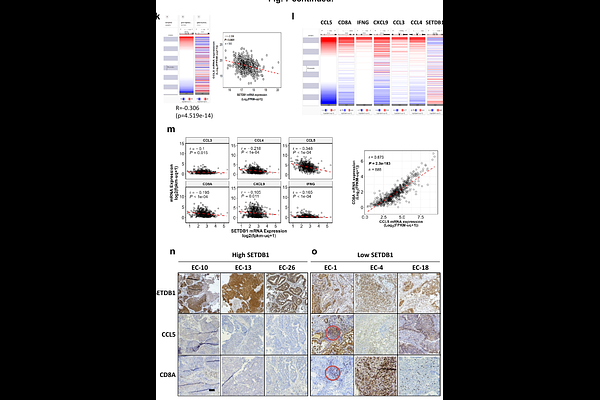Oncogene SETDB1s Dual Role in Endometrial Cancer: Driving Tumor Progression and Immune Escape

Oncogene SETDB1s Dual Role in Endometrial Cancer: Driving Tumor Progression and Immune Escape
Salari, K.; Hao, J.; Jilek, R.; Wells, M.; Li, T.; Johnson, E.; Meng, W.; Zibble, E.; Allen, A.; Gilbert, J.; McLerran, R.; Schuett, E.; Oliva, C.; Griguer, C. E.; Meyerholz, D. K.; Yates, M.; Keen, H. L.; Meng, X.; Xiong, Y.; Li, B.; Yang, S.
AbstractOncogene SETDB1, an H3K9 methyltransferase, drives tumorigenesis in various cancers. Using endometrial cancer (EC) as a model, we discovered SETDB1s dual mechanisms in driving EC tumorigenesis and mediating immune evasion. SETDB1 knockout (SETDB1-/-) tumor-bearing mice exhibited prolonged survival of up to 100 days. Transcriptomic profiling of SETDB1-/- EC cells revealed decreased expression of oncogenes (POLR2A, MSH6, FLNA) and increased expression of tumor suppressor genes (PGR, RERG, ZNF582), which indicates that SETDB1 intrinsically promotes EC tumor proliferation by regulating these downstream genes. SETDB1 repressed repeat elements and the interferon pathway, mediating immune evasion extrinsically by inhibiting anti-tumor macrophage infiltration. ChIP-seq analysis showed SETDB1 binding at pericentromeric regions on many chromosomes and numerous ZNFs. Loss of SETDB1 resulted in abnormal cell division. SETDB1-/- tumors displayed reduced proliferation markers (Ki67, pHH3) and increased macrophage infiltration.\n\nMechanistically, SETDB1 promotes CD47 (a dont-eat-me signal) and represses CCL5 and CXCL9 (macrophage and T-cell recruiting chemokines), contributing to immune evasion. M1-like macrophages killed more SETDB1-/- cells in co-culture. Additionally, SETDB1 knockout in mouse EC cells reduced tumor growth in C57BL/6 mice, with increased macrophage and CD4+ T-cell infiltration. Our results indicates that elevated SETDB1 and its target genes can predict higher tumor grade and worse survival, suggesting that targeting SETDB1 could be a promising therapeutic strategy for EC.